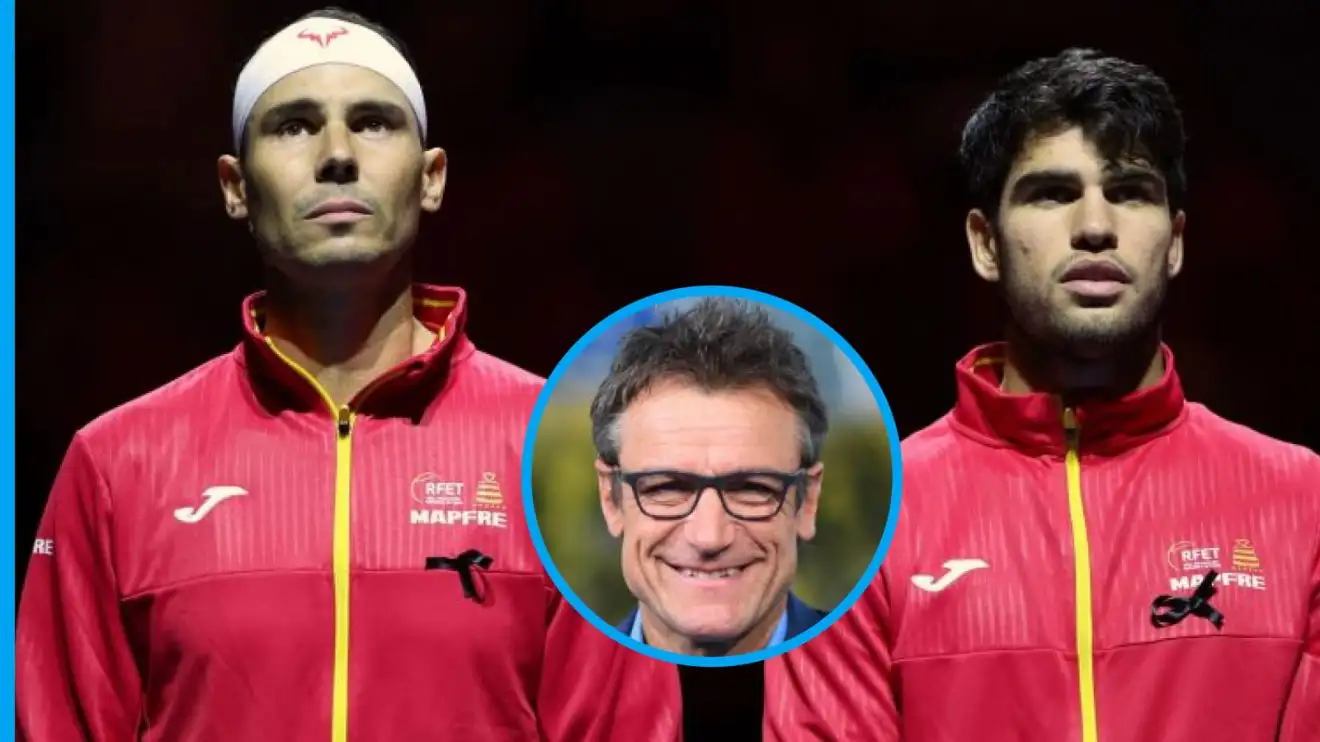
The tennis world is abuzz with speculation about what Rafael Nadal’s post-retirement journey will entail. As one of the sport’s greatest icons, with 22 Grand Slam singles titles and an astonishing 209 weeks at the top of the ATP rankings, Nadal leaves behind an unparalleled legacy. His retirement, announced during Spain’s Davis Cup campaign, marks the end of an era. Yet, as one chapter closes, another may soon open—not just for Nadal but also for Carlos Alcaraz, Spain’s rising star and the heir apparent to Nadal’s throne.
A Passing of the Torch: Alcaraz and Nadal’s Special Bond
Carlos Alcaraz, currently ranked No. 3 in the world, has often expressed his deep admiration for Nadal. Growing up watching Nadal dominate the tennis world, Alcaraz drew inspiration from his compatriot’s relentless spirit and incredible work ethic. The bond between the two has grown stronger in recent years, particularly after they teamed up to play doubles at the 2024 Paris Olympics. Although they didn’t clinch gold, the symbolic significance of that partnership was immense—it felt like a literal passing of the torch from one Spanish legend to another.
Alcaraz’s meteoric rise has been nothing short of phenomenal. At just 21, he already has four Grand Slam titles to his name, having won Roland Garros, Wimbledon, and other major tournaments. Yet, as Mats Wilander recently pointed out, there’s still room for growth, particularly in one key area: concentration.
Wilander’s Insight: Concentration and Intensity
Former world No. 1 Mats Wilander, speaking to Eurosport, floated the intriguing possibility of Nadal coaching Alcaraz in the future. Wilander, a seven-time Grand Slam champion, believes that Nadal’s unparalleled mental toughness and ability to maintain intensity throughout matches could provide enormous value to Alcaraz.
“It is very possible that Nadal will return as a coach. I can even imagine him coaching Alcaraz,” Wilander stated. “Although Carlos has one of the best now, Juan Carlos Ferrero, he lacks the ability to maintain the same intensity throughout a match. Nadal was able to maintain that concentration, so I can see the value he could bring.”
Wilander’s assessment touches on a crucial aspect of Alcaraz’s game. While Alcaraz has shown incredible talent and resilience, there have been moments where his concentration wavered, especially in high-pressure situations. The 2024 Olympic final against Novak Djokovic is a prime example. Despite reaching the final without dropping a set, Alcaraz struggled to manage his nerves against the Serbian legend, losing in two tightly contested tiebreaks. Nadal, on the other hand, has built a career on his ability to stay mentally locked in, no matter the circumstances.
The Value of Nadal’s Experience
Should Nadal choose to step into a coaching role, his impact on Alcaraz could be transformative. Nadal’s ability to maintain focus and intensity is legendary. His career is filled with examples of matches where he outlasted opponents purely through mental fortitude. One of his most iconic victories—the 2008 Wimbledon final against Roger Federer—showcased his unbreakable concentration and willpower. Teaching these qualities to Alcaraz could help the young star reach even greater heights.
Moreover, Nadal’s understanding of the physical and emotional demands of the sport would be invaluable. He has navigated the pressures of being a top-ranked player, dealt with injuries, and managed the expectations of an entire nation. This wealth of experience could help Alcaraz handle the increasing pressure that comes with being a top player and a national icon.
Potential Roles for Nadal Post-Retirement
While the idea of Nadal coaching Alcaraz is exciting, it’s just one of many possibilities for the Spanish legend. Wilander also speculated that Nadal could become involved in other aspects of the sport, such as commentary or leadership roles within the Davis Cup. “Either way, Nadal will be involved in thinking about tennis, either as a coach or as a commentator, and that is very valuable. He could even become the Davis Cup captain in the future,” Wilander noted.
Nadal’s deep connection to the Davis Cup makes this a particularly compelling suggestion. The Davis Cup has always held a special place in Nadal’s heart; he has represented Spain in numerous campaigns, helping them win multiple titles. Stepping into a leadership role could allow him to continue contributing to Spanish tennis while mentoring the next generation of players.
The Farewell Controversy
Nadal’s retirement announcement at the Davis Cup was somewhat overshadowed by controversy. His final match, a straight-sets loss to Botic van de Zandschulp, marked a quiet end to a glittering career. The post-match retirement ceremony drew criticism due to the absence of key figures like Novak Djokovic and Andy Murray, who had been expected to attend. Reports indicated that the ceremony was hastily arranged after Spain’s unexpected exit from the tournament, catching organizers off-guard.
However, Wilander offered a different perspective, urging fans to focus on the bigger picture. “I disagree a little with people who think it wasn’t the perfect farewell,” he said. For Wilander, the true measure of Nadal’s legacy lies not in a single ceremony but in the countless moments of brilliance he brought to the sport.
A Bright Future Ahead
As Nadal steps into retirement, the tennis world watches with anticipation to see what he’ll do next. Whether he chooses to coach Alcaraz, take on a leadership role in Spanish tennis, or simply enjoy some time away from the spotlight, one thing is certain: his influence will continue to be felt.
For Carlos Alcaraz, the prospect of being mentored by his idol is tantalizing. With Nadal’s guidance, Alcaraz could refine his mental game and develop the consistency needed to dominate the sport for years to come. As Spain transitions from one era to the next, the combination of Nadal’s wisdom and Alcaraz’s raw talent could ensure that Spanish tennis remains a formidable force on the global stage.
Leave a Reply